 By Staff By Staff
May 15th, 2015
BURLINGTON, ON
If there was ever any doubt that thieves regularly steal your identity any way they can – read on.
On Wednesday May 13, 2015 at 6:45am a Halton Regional Police uniform officer on patrol at Motel 6, located at 4345 North Service Road in the City of Burlington observed a motor vehicle that had been recently reported stolen by Ottawa Police. The vehicle was stopped and the occupants subsequently arrested.
Further investigation revealed the two female occupants in the vehicle were also in possession of several pieces of counterfeit government identification, stolen credit cards and a small quantity of marihuana.
Accused:
Line PHRAND, 55 years, from St.Andre D’Argenteuil, Quebec
Cynthia GILBERT, 38 years, from Montreal, Quebec
have both been charged with:
Possession of Stolen Property over $5000
Unauthorized Possession of Credit Card Data
Possession of Identity Theft Documents
Possession of Counterfeit Mark
Possession of a Controlled Substance
Anyone with information on this or any other crime is asked to call Crime Stoppers at 1 800 222-8477 (TIPS) or through the web at www.haltoncrimestoppers.com or by texting “Tip201” with your message to 274637 (crimes).

 By Staff By Staff
June 30th, 2014
BURLINGTON, ON.
They are doing it again. This time the identity thieves are using Amazon as the skirts they hide behind.
 We didn’t place this order. We got this notification of an order we are supposed to have placed – we didn’t place any such order. We now buy most of our books from A Different Drummer Book store.
However we have in the past purchased from Amazon and it is conceivable that I might have thought my wife placed an order and I would want to see what was bought.
The moment I click on that link – they have me. They then begin to suck information out of me and, if I am gullible enough, they might convince me to give them credit card and banking information. Once that happens you can almost hear the sound of their sucking money out of your accounts.
If it doesn’t look real – then it probably isn’t. That is especially the case with the internet.
Caution, always caution.

 By Staff By Staff
April 5, 2-14
BURLINGTON, ON.
Another ID theft attempt.
The people who do this like using national brands – companies you might have used in the past. This latest one involved Amazon – a company I have used in the past.
They got one of my email addresses and sent me an email they hoped I would think it came from Amazon. However, I haven’t used Amazon since I moved to Burlington. The Different Drummer has everything I need but for those who like the Amazon service – they may have been taken in.
Look carefully at the address of the sender.
 Notice that the domain name is spelt “amazons.ca” And that isn’t amazon is it? Notice that the domain name is spelt “amazons.ca” And that isn’t amazon is it?
You have to be careful – It’s sort of like counting your change before you leave the store.

 By Staff By Staff
April 1, 2014
BURLINGTON, ON.
Some people will get taken in by this. If they bank with the Royal Bank of Canada they might click on that link – and that could well be the beginning of a process that moves your money from your bank account to someone else’s bank account.
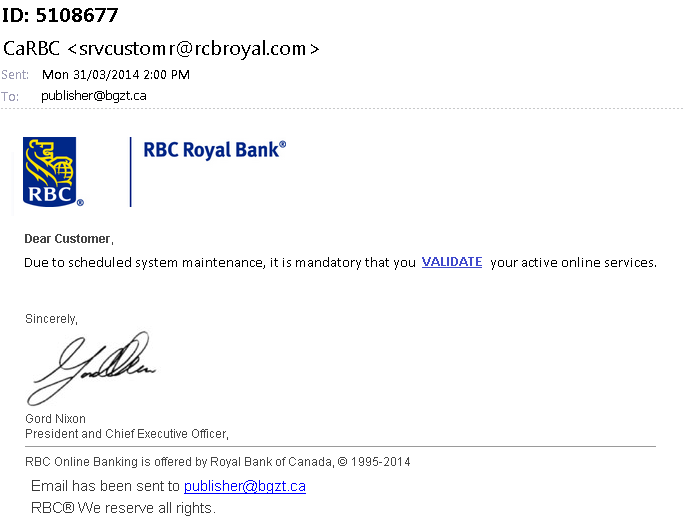 What’s the give away here? Look at the address of the sender: rcbroyal – if it were legal it should have read rbcroyal. Also the srvcustom r – spelling error. Most important – a Canadian bank would never, ever send you a notice like this. If you are at all active on the internet – and it’s hard not to be – you need to be vigilant. There are literally tens of thousands of people pumping out phony messages that are intended to steal your money from you.
At a quick glance they look genuine and they catch your attention.
This latest one, purported to come from the Royal Bank is pretty easy to spot as phony but you do have to look beyond the bank logo which is in the message to give you comfort that it is your bank talking to you.
Just pay attention – and you should be OK. Unfortunately, if money does get removed from your account – it will not be easy to get it back.
Background links:
They will go to almost any length to fool you.

 By Staff By Staff
BURLINGTON, ON.
January 20, 2014
It appeared as an email to “undisclosed recipients”. For those that get taken in by these attempts at Identity Theft this one had an intriguing angle. The names, said the email, had been drawn from the Samsung database of telephone and internet email users. At some point I may have been on the Samsung web site and asked for some information. There were none of the usual spelling mistakes. But the language gives it away.
What would you have done with this one?
Had you responded you would have given away a lot of information about yourself that someone would be selling to people who are never described as nice.
**************THIS IS NOT A SPAM************** Samsung Europe Internet Prize and Email Messaging Center P.O Box 732
Rotterdam- The Netherlands
Telefax: 0031-844-393-028
www.samsung.com/europe
WINNING NOTIFICATION: Coupon Number: Q-119/SRV The sum of Seven Hundred and Fifty Thousand Euros with a Samsung Ativ Book9 lite and a Samsung Galaxy NoteIII have been awarded to you from Samsung database of telephone and internet email users from which your email address was attached to the winning Coupon Number: Q-119/SRV.
Contact the notarization officer with your winning coupon number and required information for your notarization for transfer below.
CONTACT:
Smit De Keizer(Mr.) Claims Agent / Notarization Officer.
Contact Email: samsung.eu@europe.com
Provide required information:
Full Names:
Age:
Occupation:
Address:
Nationality:
Country of Residence:
Tel number:
Email:
Mode of Payment: (Bank Transfer, Bank Cheque or Personal Claim) Note that any leakage of your winning notification resulting to a double claim will automatically forfeit your winning prize thus we advise you to keep your winning notification message confidential and away from public notice to prevent double claims or impersonation until after remittance/payment to you.
Your Faithfully,
Victoria Van Eggo.(P.R.O) Samsung Europe
© 2014 Samsung Europe. All rights reserved. Terms of use. Privacy Statement¬
Had this come to you – what would you have done? Identity theft happens and people get seriously damaged financially. Know more and protect yourself. And lighten up on the greed factor and you’ll be just fine.
Background links:
How the identity theft thieves really work.

 By Staff By Staff
BURLINGTON, ON.
January 14, 2014
Identity theft is a BIG business, and a rather successful one for some people as well. This message came floating in earlier today. What are the clues?
Well, first the receiver of the email is not an Apple product user, second look at the email address it was sent from and then note the date at the bottom of the email.
Look at the language – there is no way Apple is going to let a message that poorly crafted get sent out.
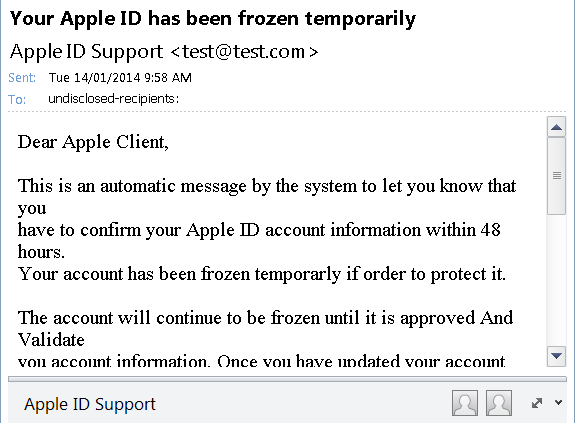 If you use Apple products you might have thought this was a legitimate message. It isn’t – phony as a three dollar bill. The full message reads:
This is an automatic message by the system to let you know that you
have to confirm your Apple ID account information within 48 hours.
Your account has been frozen temporarily if order to protect it.
The account will continue to be frozen until it is approved And Validate
you account information. Once you have updated your account records
, your information will be confirmed and your account will start
to work as normal once again.
This will help protect you in the future. The process does not take more than 5 minutes.
To proceed to confirm your account information Click here
Copyright © 2013 Apple Inc. All rights reserved.
If you click there you are in the process of telling thieves, probably in Nigeria, more about you than they should know.
If the message doesn’t make sense to you – delete it.
Background:
Identity theft is a BIG business – the purpose of which is to steal your money.

 December 30, 2013 December 30, 2013
By Staff
BURLINGTON, ON. It doesn’t take the identity thieves and the bank scammers very long to find a new angle.
 This is what the email message looked like. The language used gives this one away – as well as the country code in the url. Yesterday emails began going out advising you that the government had a tax refund for you – all you had to do was fill in a form and the dollars would flow your way.
 If you had good email security software in place you would have gotten this message. If you didn’t – you would have gotten a form that looked like the kind of thing a government agency might have sent out and had you filled in the form someone who wants to steal your money would have had the kind of information needed to do just that. If you had good email security software in place you would have gotten this message. If you didn’t – you would have gotten a form that looked like the kind of thing a government agency might have sent out and had you filled in the form someone who wants to steal your money would have had the kind of information needed to do just that.
If it looks to good to be true – that’s because it probably is too good to be true.
This email message was sent out to tens of thousands of unsuspecting people with Canadian email addresses. Where did they get the name? That is a tougher question to answer.
.

 By Pepper Parr. By Pepper Parr.
BURLINGTON, ON. August 9, 2013. The first time you read the email you wonder – what is this? How did they get my name and – this isn’t real is it?
A lot of people take a second look and click on a link or respond to a message. When they do that they have begun to engage the person who sent the email. The people who send this stuff are patient; they have nothing else to do but build confidence with you, make you believe that they are for real.
Dear Sir/Madam
I am sorry to bug your privacy. My name is Siti Rohani Salleh, I am the wife to late Abu Talib Yadin who happens to be a government contractor, trader and a politician. My husband was divisional treasurer of trade and contractors of the Malaysian Indian Congress in Perak state. He was brutally murdered by opposing members of his party for his straightforwardness and accountability though the government claimed that it was a robbery attack but everybody know it was assassination by some people in government. I was lucky to stand this gruesome murder on the night of Saturday, 15th September 2012 but they still stabbed me on my abdomen but I was lucky to escape. I was rush to the hospital by some neighbors and eventually the same assassin still came to the hospital in Malaysia just to take my life but eventually they miss their access to my ward.
So I had to instruct our account manager to transfer our money to South Africa where I had to run and seek asylum/refugee. Presently I am in the government hospital.
Please copy link below and read more about the incident where my husband was murdered on 12th September 2012.
https://thestar.com.my/news/story.asp?sec=nation&file=/2012/9/15/nation/12034249
I write you to seek your assistance in the security of US$5.5million Deposited by me with a SOUTH AFRICAN RESERVE BANK before I seek refugee/asylum here. The South African reserve bank will allow you go on their online banking to transfer the funds. I am the only one with direct access and information of this deposit.
I decided to seek help knowing that My days are numbered having received a call from the Reserve bank that they will turn the deposit to its government treasury if I fail to present a representative for the claim. I seek your assistance to be made the Administrator to this inheritance since I have no relative or children. I intend to introduce you to the director of the bank whom I deem very competent to guide you through this claim process. Please get back to me for more information on this inheritance.
I was lead (note the spelling error) by the Almighty to send this mail to you after serious thought of all emails I saw on the internet. Please treat this seriously. I have all documents of deposit of this fund to proove I hope to hear from you soonest before I go.
Thank you. send your reply to me so that we can finalize this transfer within 3 days, I have all documentation to back up this claim, this is my email address: mrsitis@aol.com Mrs.Siti Rohani Salleh. Reply me to: mrsitis@aol.com
The people who sent you this are hoping you will be enticed to click on the email and if you do that – you have taken the first step to someone beginning the process of stealing more of your identity and as much of your money as they can.
The stealing of your identity will have already begun if you get an email like the one below. They have your email address – what else do they have?
There are people who earn their living this way – they look for naive people, gullible people, curious people or greedy people and they work their scam.
 Spend $10 on a good read and the best introduction you will ever get to how identities are stolen and why you get some of the email that appears in your inbox. Just how this is done was explained all too well in a book written by Will Ferguson “419”, a title that became a best seller and won the Scotiabank Giller prize in 2012, is the story about a man who got pulled into one of these scams and chose to end his life.
The book is a great read – and an interesting look at what the police in this country can and can’t do about identity theft.
We quote from the book, which is fiction, and very well researched. Detectives from the Economic Crime Unit of a police service are explaining to a woman whose father got taken that “The only defence we have with these types of fraud is education”.
In the novel the police show the woman some of the documents they have collected. “One is both very specific and oddly vague: A Fund Management Agreement issued by the Central Bank of Nigeria; an International Remittance voucher; a Certificate of Registration; Letters of Intent, affidavits, court orders, banking forms, all duly signed and duly sealed.”
And all phony, all created to fool people into parting with their money.
The people who do this type of thing are pretty good at it – but they succeed only because they gain your confidence.
In Will Ferguson’s “419” he takes you through just how the thieves, all from Nigeria in this book, work to gain a person’s confidence.
“These are some of the actual documents your father received; our tech unit recovered them from the cached files on his hard drive. You father had tried to delete them in the days before his accident. He thought he had cleared the memory – here – your father would have scanned and signed these forms and then emailed them back to Nigeria as attachments.”
When you get emails like this – scroll through it – some of the claims these people make are amazing – just don’t click on any of the links – you don’t really know where they are going to take you.
This is one of an ongoing series the Gazette will be doing on Identity Theft as part of an effort to make our readers more aware of what might show up in your email inbox one day.

 By Pepper Parr By Pepper Parr
BURLINGTON, ON. August 4, 2013. One of the biggest problems we face as a society is the theft that takes place of money that is not in our wallets or purses. Some call it identity theft; others call them scams – the result is usually the same – someone we don’t know, will never see, manages to convince us to give them information that allows them to take money out of our bank or from our credit cards.
They often get our money because we are greedy and think that there really is something for nothing waiting for us out there. Do we really believe someone in Nigeria has millions of dollars they want to get out of that country and that they will give us a large portion of that money if we help them? Some people do.
Does anyone not know someone who got sucked in by one of these schemes? The thieves play upon our greed or our naivety to get us to part with information they need to get our money.
The Gazette is doing an ongoing series of articles on identity theft and how these thieves work to take advantage of us.
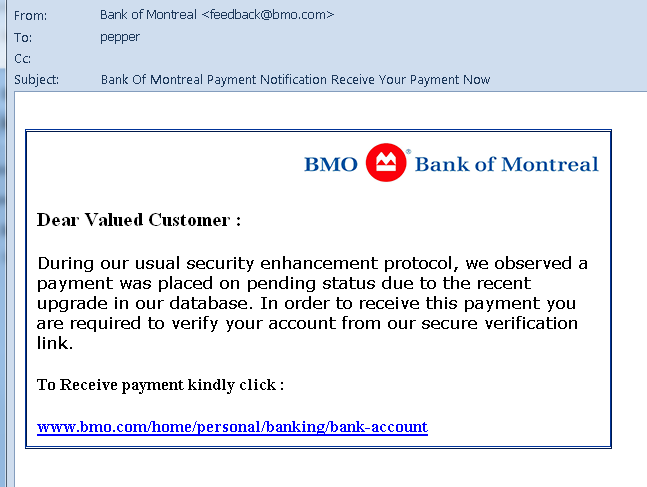 Read the notice I got carefully – what tells you this is a phony message designed to get me to give the sender information that would allow them to take money from my bank account. I happen to bank with the Bank of Montreal. Earlier today I got an email, sent to an address I seldom use. It was an email from my bank – well let the following tell the story.
Why is my bank telling me about a payment? And just what is a “pending status”. It sounds kind of official.
The email tells me that I am required to verify something – online. They use the words “secure verification link” but that’s just to make you feel confident.
There isn’t a bank in this country that is ever going to send you an email like this.
A bigger reason to be suspicious is in the Subject line. “Receive your payment now”; that’s the kind of language advertisers use.
The people who send emails like this buy lists of names from other thieves online and then they send out tens of thousands of emails. It doesn’t cost them a dime to send the email.
If one ploy doesn’t work – they will try another.
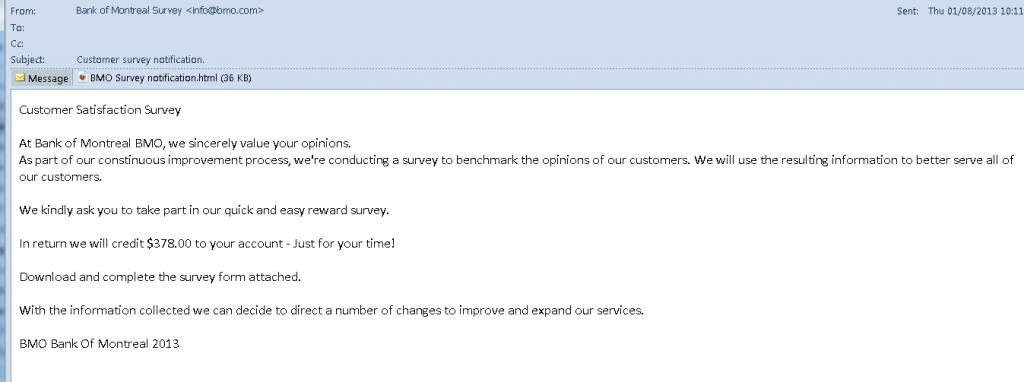 This was a really direct attempt to get information. Banks do customer satisfaction surveys but they don’t use email and they don’t offer money if you do the survey. $378. is far more than any survey company will ever pay for participating. The best you’re going to get is a gift card for maybe $20. This one was pretty blunt and played on that little bit of greed we all have in us. I didn’t download this one – it would have taken me to a web site that could do very serious damage to the information on my computer.
It would have given them access to all my contacts and might have permitted the sender to install software on my computer that could capture every keystroke I entered.
This type of data theft is particularly vicious – but that $368 looks tempting to some people.
What can you do to protect yourself? Common sense and remember – if it looks to good to be true – that’s because it isn’t true.
This is one of an ongoing series the Gazette will be doing on Identity Theft as part of an effort to make our readers more aware of what might show up in your email inbox one day.

 By Staff By Staff
BURLINGTON, ON. – July 25, 2013. The Halton Regional Police would like to caution the public that scammers are using the names of the RCMP, the Canadian Security Intelligence Service (CSIS) and the Canadian Association of Chiefs of Police (CACP) in a computer scam.
Individuals report a frozen computer, or they have been locked-out of their computers, after receiving pop-up messages warning that the computer has been associated with pornography.
These warning messages claim to be from one of these agencies, and tell the recipient to pay a “fine” so the computer can be “unlocked.” The message also claims that if the “fine” is not paid within 72 hours, criminal proceedings will commence against the user.
“These types of messages, commonly known as “scareware”, are designed to create such shock and anxiety that victims respond by sending money quickly,” states the RCMP in a news release.
The public is advised that if you receive one of these messages please be aware that it is a scam and has not been issued by the CACP, CSIS or the RCMP.
Do not pay the $100.00 “fine”. Being “locked out” of your computer is an indication that your system may have been infected with malware and you will need to take steps to address that problem.
The police pass along some tips to help keep your computer protected:
• Never click on a pop-up that claims your computer has a virus;
• Update your anti-virus software often and scan your computer for viruses regularly;
• Do not click on links or attachments in e-mails sent to you by someone you don’t know;
• Turn on your browser’s pop-up blocking feature;
• Never download anti-virus software from a pop-up link sent to you in an e-mail.
If you have received a “scareware” message please report it to your local police office and the Canadian Anti-Fraud Centre (1-888-495-8501).
One might ask why someone would be worried about being told there was pornography on their computer if they never visited one of those websites. Of course, if a person has visited such a site – perhaps there is reason to be afraid.

 By Pepper Parr By Pepper Parr
BURLINGTON, ON. March 5, 2013 There isn’t one of us that doesn’t find at some time that their computer isn’t doing what we wanted it to do and we are flummoxed in figuring out what has gone wrong. So when someone calls saying they can help – all caution gets set aside and we eagerly answer the questions we are asked by the person who called.
We don’t ask – how does this person know I am having a problem with my computer? As soon as you have answered the first two questions – they have you. All that isn’t known is how far they are going to take you and how much of your money they are going to end up with. They are not going to fix anything on your computer but, according to the Regional Police they are probably going to install a virus on your computer and then try to convince you to pay them to remove that virus.
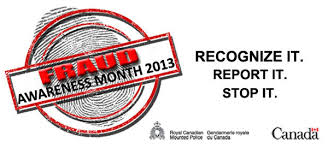 The best protection available is you asking questions. March is Fraud Awareness Month – use the time to think about who you let near your computer. If you don’t personally know the person calling – hang up.
The Halton Regional Police are warning the public to be suspicious of any calls they receive from people claiming to be employed by a computer company that has become aware of a problem with your computer – they will tell you it is infected with as virus they can remove.
This is known as the “Anti-Virus Scam” which has been around for several years. Between March 1st 2011 and August 31st 2012, the Canadian Anti-Fraud Centre has received 13,842 complaints of this type with a total dollar loss of $814,511.00. In most cases, these calls are originating from call centers based outside of Canada.
As part of this scam, the call recipient would be instructed to do a series of keyboard commands that would allow the caller to remotely access the computer over the internet and actually install the “virus” to make the computer appear to be infected. The caller would then remove the “virus” and request credit card payment anywhere between $35.00 and $469.00 for their services.
In some instances, the same person will call back and report that the version of the security software has expired and request an additional $100.00 to have it re-activated. They got you once and they figure they can get you a second time.
If you receive an unsolicited call from people telling you that your computer is infected with a virus or that your version of security software is inactive or invalid, you are urged to hang up – this is someone wanting to defraud you of money to fix a problem they may have created.
 If you don’t know them – don’t deal with them. Allowing a third-party, someone you don’t really know, to remotely access your computer, puts you at considerable risk. They can install software that logs every keystroke you make and capture sensitive data , such as online banking user names and passwords, bank account information and other information to steal your identity.
Police are also reminding the public to be very careful about providing credit card and/or banking information to anyone over the phone and internet, especially in cases where the call was unsolicited.
March is Fraud Awareness Month. Police ask you to please take the time to educate yourself, your family and your friends on how not to become victims of Fraud. For further information, please visit www.haltonpolice.ca or the Canadian Anti-Fraud Centre website.

 By Staff By Staff
BURLINGTON, ON October 1, 2012 Halton Police want to warn residents to be on the lookout for phony telephone solicitations to repair your computer.
There are variations to the scam, according to police, but generally the caller identifies themselves as a representative of a computer service or repair firm and professes to know the resident is experiencing computer problems. The resident is tricked into accessing a particular website, providing personal information and eventually the caller gains access to their computer. The purported fee for ‘assisting’ the resident ranges, but in one recent case, a victim paid a few hundred dollars.
 An offer to repair your computer by someone you don’t know is like giving them your wallet. Police offer the following advice to avoid becoming victimized by persons claiming to be computer company representatives.
DO NOT purchase any software or services.
Ask if there is a fee or subscription associated with the ‘service’. If there is, hang up.
Never give control of your computer to a third party unless you can confirm that it is a legitimate representative of a computer support team with whom you are already a customer.
Take the caller’s information down and immediately report it to your local police.
Never provide your credit card or financial information to someone claiming to be from a computer technical support company.
Good advice.

 By Pepper Parr By Pepper Parr
BURLINGTON, ON June 29, 2012 Halton Regional Police have laid a total of 140 charges related to fraud and identity theft
Early in March 2012, the Regional Fraud Unit began an investigation that focused on a large amount of identity theft and account takeovers within the Halton and Toronto area.
 Thieves see identity theft as easy - they see your identity as money in their pockets. Protect yourself. The targeted group would commit identity thefts and attend financial institutions and get access a victims bank using identity they had stolen and then removing funds from an account.
The project culminated on June 27th with the arrest of three individuals and residential search warrants executed in both Milton and Toronto. Police recovered an assortment of identity documents, false identifications, credit cards, computers, instruments of forgery and cash.
Police are in the process of contacting the victims of these identity thefts and the investigation is ongoing as police anticipate laying additional charges.
Charged are Christopher Corey DEWSBURY (31) and Camille DEWSBURY (30) of Milton and Shelley Marie BOIS (53) of Toronto.
The trio face over 140 criminal code charges relating to Fraud, Possession of Counterfeit Mark, Possession of Identity Information and Conspiracy to Commit an Indictable Offence. All are scheduled to appear in Milton Court on the 24th of July, 2012.
Anyone with information concerning this or any other crime is asked to call Crime Stoppers at 1 800 222-TIPS(8477), through the web at www.haltoncrimestoppers.com or by texting “Tip201” with your message to 274637(crimes).

 By Staff By Staff
BURLINGTON, ON May 31, 2012 The Fraud unit of the Halton Regional Police is keeping very busy – they recently arrested three people who have been stealing identities and using those identities to purchase high value items at big box stores in a stretch of Ontario that runs from Mississauga to Brantford.
Detective Brad Murray, Regional Fraud Unit, who was involved in the arrest of a group that were skimming data from Automatic Teller Machines a number of months ago has put his experience with identity fraud to this most recent case.
The investigation into his most recent challenge began back in April and culminated on May 23rd with the arrest of three individuals and a search warrant on their residence. Police recovered an assortment of gift cards, $8000.00 in US and Canadian currency along with $20,000.00 in jewellery.
 Also located in the home were over 27 different identities and a taser/stun gun. Police are in the process of contacting the victims of the identity thefts and the investigation is still ongoing as investigators anticipate laying additional charges. Also located in the home were over 27 different identities and a taser/stun gun. Police are in the process of contacting the victims of the identity thefts and the investigation is still ongoing as investigators anticipate laying additional charges.
Charges are Craig Alanzo McIntosh (37), Kevin Oneil McIntosh (35) and Jennifer Halyk (32) all of Mississauga. The trio face over 95 criminal code charges relating to Fraud, Possession of Property Obtained by Crime and Possession of Identity Information. All are scheduled to appear in Milton Court on the 19th of June, 2012.

 By Pepper Parr By Pepper Parr
BURLINGTON, ON April 27, 2012 One of the things about crooks and thieves is that when they come across a good idea that pulls in all kinds of suckers, they use it over and over and over. They will quit only when people stop responding to the scam.
With cyber-crime there is little risk – the people doing much of this cyber identity theft are on the other side of the world and while international level police forces are getting better at pursuing and catching them – it is going to be a long time before we see any arrests. One defence is software we can use to filter them out – but the best defence is checking everything that comes to your screen.
My wife goes over the tape the supermarket cashier gives her – it would never occur to me to look at the take; it`s all bar coded isn’t it – so where could anything go wrong. Well bar codes aren’t perfect.
 The face you think you see - the email address you think you see - may not be coming from the people you think it is coming from. Watch carefully every time. Earlier this week we alerted you to a scam we came across – turns out that this good idea has been taken up by others and now Amazon and Twitter are being exploited.
We got the following related to our Twitter account:
Our system detected unusual activity associated with your account.
Your account may be temporarily suspended for violations of the Twitter Rules.
We suspend accounts for investigation if we suspect an account has been hacked or compromised.
You need to confirm your email address to regain access to your account.
Once you regain access, you will be able to request a new password for your Twitter account.
You can find information on following automations and permitted following behaviors on the help page:
https://support.twitter.com/
The email address this message came from was
Twitter <c-nfxzlxr=znvy-ba.hf-ae0dc@postmaster.twitler.com
Take a careful look at that address – notice they have spelled Twitter as twitler – and that my friends is not the same.
Also the use of English is awkward and that is always a tell tale sign.
We have a Twitter account – we don`t use it very much – so undue activity was the first clue, but had we been using the Twitter account heavily we just may have responded. With the cyber crooks out there ready to do anything they can to steal your identity, you do need to be vigilant.
The same day we got a notice about our Amazon account. We have in the past bought items from Amazon but recently we have supported the local bookstore – A Different Drummer – so we know the Amazon notice was a fake as well. Here is what we got from them:
We received a request to reset the password associated with this e-mail address. Please follow the instructions below.
Click the link below to complete or cancel request using our secure server:
https://www.amazon.com/ap/forgotpassword?arb=84a424dc-5467-b5de-c0a4-8e65672465a4
If clicking the link doesn’t seem to work, you can copy and paste the link into your browser’s address window, or retype it there.
Amazon.com will never e-mail you and ask you to disclose or verify your Amazon.com password, credit card, or banking account number. Thanks for visiting Amazon.com!
Sounds pretty legitimate. But take a careful look at the way amazon is spelled in the domain name part of the email address they used.
See the double m.
Amazon.com account-update@amazomm.com
I don’t think that is Amazon trying to tell me something. I think those guys are crooks trying to get information from me.
What do you think?

 By Pepper Parr By Pepper Parr
BURLINGTON, ON April 25, 2012 The email message started out nicely enough. Hello, it said. And it was from The Facebook Team. Given that I`m a Facebook user – I read the message.
Here`s what it said:
The Facebook account associated with pepper@mcsops.com was recently changed.
If you were not the one who changed this account, please visit our Help Center to cancel the request.
Please note: for your protection, this email has been sent to all the email addresses associated with your Facebook account.
https://www.facebook.com/
Thanks,
The Facebook Team
 Cyber thieves can collect bits and pieces of information about you and create an online identity that says it's you but isn't you - and they can do a lot of damage. Be vigilant. Hmm, I wondered – I didn’t change my Facebook password. Then I looked at who the email actually came from. Pay close attention to the line that follows.
notification+pepper@facebookmeil.com
That is who supposedly sent me the message. Check the spelling – notice it says facebookmeil.com
The message didn’t come from Facebook at all – it came from somebody who got their hands on a list of email addresses and sent the same email to millions of people. Those that responded will have been pulled into a process that begins gathering information on them – and when they get enough they can begin to impersonate you. Imagine if someone got into your Facebook page and started rummaging around there.
If you get the message – ignore it. And pass this story along to every friend you have.
These crooks are going to do a lot of damage with this identity theft attempt.

|
|
 By Staff
By Staff













 By Staff
By Staff




























